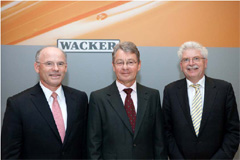This year's €10,000 WACKER Silicone Award was presented today to Professor Ulrich Schubert, who holds the Vienna University of Technology's chair of inorganic chemistry. Held at WACKER's Munich headquarters, the award ceremony was attended by Bavarian Economics Minister Martin Zeil. Dr. Rudolf Staudigl, President and CEO of Wacker Chemie AG, said that Schubert had been chosen because of his trail-blazing work on metal-silicon complexes and his materials science studies such as the sol-gel process. Along with the Kipping Award, the WACKER Silicone Award is the world's most prestigious honor in silicon chemistry.
 Presentation of the 2009 WACKER Silicone Award in Munich (from left): Dr. Rudolf Staudigl (WACKER President & CEO), award winner Prof. Dr. Ulrich Schubert (Vienna University of Technology) and the Bavarian Economics Minister Martin Zeil. (photo: Wacker Chemie AG)
Presentation of the 2009 WACKER Silicone Award in Munich (from left): Dr. Rudolf Staudigl (WACKER President & CEO), award winner Prof. Dr. Ulrich Schubert (Vienna University of Technology) and the Bavarian Economics Minister Martin Zeil. (photo: Wacker Chemie AG)
In his address, the Bavarian Economics minister highlighted the chemical industry's significance as a key innovation driver for the German economy. "Innovations underpin our economic growth and This year's €10,000 WACKER Silicone Award was presented today to Professor Ulrich Schubert, who holds the Vienna University of Technology's chair of inorganic chemistry. Held at WACKER's Munich headquarters, the award ceremony was attended by Bavarian Economics Minister Martin Zeil. Dr. Rudolf Staudigl, President and CEO of Wacker Chemie AG, said that Schubert had been chosen because of his trail-blazing work on metal-silicon complexes and his materials science studies such as the sol-gel process. Along with the Kipping Award, the WACKER Silicone Award is the world's most prestigious honor in silicon chemistry.
In his address, the Bavarian Economics minister highlighted the chemical industry's significance as a key innovation driver for the German economy. "Innovations underpin our economic growth and prosperity. In this respect, the chemical industry plays a major part, because its development of innovative processes and products represents a unique contribution to the transfer of knowledge and technology between university-led research and industrial application."
WACKER CEO Dr. Rudolf Staudigl described this year's award winner as a major researcher in organosilicon chemistry. "Professor Schubert has had a formative and enriching influence on silicon research. His work on metal-silicon and metal-tin complexes and his materials science studies regarding the sol-gel process are trailblazing." He added that the diversity of fields that Schubert had covered during his academic career was truly impressive. "His research ranges from the fundamentals to materials chemistry. Because much of his work has practical relevance, it remains important not only academically, but also industrially."
The focus of Professor Schubert's early research encompassed metal-silicon and metal-tin complexes exhibiting metal-hydrogen-silicon and metal-hydrogen-tin three-center two-electron bonding. Shedding light on these bonds provided a deeper understanding of the mechanisms exhibited by silicon-hydrogen bonding to a transition metal such as platinum. These processes play a key role, for instance, in the production of silicone elastomers and organo-functional silanes both of which are also manufactured by WACKER.
Other topics of his work include silyl complexes of precious and semiprecious metals, and studies on fundamental organometallic reactions such as the oxidative addition and reductive elimination of silicon-element and tin-element bonds to metals. In the mid-1980s, Schubert started shifting his focus to the materials sciences, especially the sol-gel process. His research highlighted basic mechanisms and industrial applications of his findings. For example, he was the first person to develop organically modified silicone aerogels and he devised a method of producing metal oxides and metal nanoparticles with a narrow particle-size distribution within a silicon dioxide matrix generated by the sol-gel process. This process has considerable potential for catalysis applications, for instance.
Additionally, Schubert investigated the synthesis of titanium and zirconium clusters with polymerizable organic ligands. The appeal of this field was that such clusters could be incorporated into organic polymers for the first time. As a result, the mechanical properties of materials can be enhanced, or materials can be given special optical or electrical properties. WACKER CEO Staudigl: "Professor Schubert has demonstrated impressively how the innovative potential of organosilicon chemistry can be exploited even more effectively."
Born in Regensburg in 1946, Prof. Ulrich Schubert studied chemistry at the Technical University of Munich (TUM). In 1974, he obtained his doctorate in the lab group of Prof. E. O. Fischer, winner of the 1973 Nobel Prize in Chemistry. For his post-doc work, he attended Stanford University in Palo Alto, USA, from 1975 to 1976. His academic career began in 1980 when he became a lecturer at TUM. In 1982, he was appointed C3 Professor of Inorganic Chemistry at the University of Würzburg. From 1989, he also headed the "Inorganic-Organic Polymers" department at the Fraunhofer Institute of Silicate Research (ISC) in Würzburg. Since 1994, he has held the Vienna University of Technology's chair of inorganic chemistry and headed its Institute of Materials Chemistry.
Prof. Ulrich Schubert has received a variety of honors and awards for his research and work as university lecturer. His distinctions include the Haines-Morris lectureship from the University of Tennessee in Knoxville, USA (2000), the membership of the Austrian Academy of Sciences (2005), the fellowship of UK's Royal Society of Chemistry (2005) and the membership of the German Academy of Sciences Leopoldina (2006). Professor Schubert chaired the Austrian Chemical Society (GÖCh) from 2001 to 2004. He has been a member of the senate of the Vienna-based Christian Doppler Research Association since 2004 and of the Executive Committee of the Austrian Science Fund (FWF) since 2005.